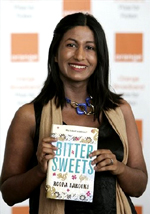|
|
|
|
The Nation and the Liberal Polemicist examines the writing of India's liberal polemicists on the Mumbai terror attacks.

 Read Read |
|
|
|
|
|
|
|
|
IPL, 20-20 Cricket and Audience Manipulation
tries to find logic in the aesthete's view that places 20-20 cricket much lower than traditional test cricket.

 Read Read
|
|
|
|
|
|
Books: |
|
|
The White Tiger: A Novel by Arvind Adiga

Review 1: Two Destinies
 Read Read |
|
|
Review 2: "Gritty India" Read Read |
|
|
Films:
Slumdog Millionaire Read Read |
|
|
|
|
|
|
|
|
Digital Animation and Filmic Narration

 Read Read |
|
|
|
|
|
'Bihar' in the Telugu Cinematic Imagination

 Read Read |
|
|
|
|
|
Publishers' Puppets

 Read Read |
|
|
|
|
|
Words and Picturables

 Read Read |
|
|
|
|
|
Sam Manekshaw and the Military

 Read Read |
|
|
|
|
|
Genocide, Religion and Atonement in Liberia

 Read Read |
|
|
|
|
|
Food Commodity Prices and Food Insecurity

 Read Read |
|
|
|
|
|
Separation Anxiety: The Schisms and Schemas of Media Advocacy

 Read Read |
|
|
|
|
|
|
|
|
|
|
|
|
|
|
|
|
|
|
|
Home > Contents > Article: Nilakshi Roy |
|
|

Publishers Puppets
Publishing Strategies of British Asian Women Novelists in the New Milennium.

Nilakshi Roy |
|
|
|
|
|
|
|
|
|
|
|
Introduction

For nearly thirty years, the writers of the Indian diaspora have produced new fiction expressing their longings for home and the desire to reinvent home away from the homeland. They have portrayed interesting variations on the themes of displacement, inter-racial conflict and the negotiation of identity, social and political. British Asian fiction writers, both male and female, have largely focused on their hybrid identity and its daily negotiations with race, class and gender. Male writers like Salman Rushdie, Hanif Kureishi and Farrukh Dhondy have always been in the limelight, but British Asian women's fiction had, until the 2000s, remained submerged under the plethora of black and other minority ethnic writing in Britain. The sudden burst of women writers into the scenario calls for new readings of the market for British Asian writing. It may be interesting to inquire into how the publication strategies of the authors, British policy towards their kind of writing and the thematic concerns and stylistic aspirations of the writers themselves collude to produce a certain kind of writing. An important question is: are these portrayals of the Asian community in keeping with its perception as a "successful" and a "model" immigrant community? (1) Or are the novels only in demand because of the element of ethnicity, the dash of sex and the writers deliberately distancing themselves from the older generation, which resisted cultural assimilation, through impudent portrayals? Also, is this the correct road to producing serious literature or are the novels content with inroads into the local market for a kind of pulp? How do these new novels by women rate in comparison with those of their male peers in terms of content, style and reach?

Writing in the 1980s and 1990s
In the 1980s, British Asian writers of fiction, especially women writers, could not get published because they were told that there was 'no market' for their work. Writers like Rukshana Smith (2), Ravinder Randhawa (3), Leena Dhingra (4) could get their work published only through Rupa & Co in India, or the Women's Press, a mainstream feminist press devoted to publishing new writers. Women's Press also published the first volume Right of Way of the Asian Women Writers' Collective (AWWC) in 1988. Right of Way gave the British Asian women writers a new identity as 'coloured' feminists whose voices needed to be heard. Thus, these writers were a part of mainstream feminist publication, and though they occupied a niche, they were identified as feminists or first-time women writers, still not 'hot publishing property' as diaspora writers. Their semi-autobiographical writing voices restlessness (evident from the recurrence of journeys away from home) quests for belonging, and the difficult search for a balanced relationship with the older generation.

 The most visible novels of the 1990s were those of Sunetra Gupta, Atima Srivastava, Ravinder Randhawa and Meera Syal. There were also other single novels published by promising writers who moved on to other genres - The Red Box by Farhana Sheikh who turned to writing drama and Haven't Stopped Dancing Yet by Shyama Perera, a columnist and television host. These novels focus on loneliness, intergenerational differences and the desire to make a home and find an identity in England. The female Bildungsroman (5) continued to be the dominant Meera Syal genre of British Asian fiction in the 1990s. These authors created exemplary protagonists who represented their own community - or a segment of the mainstream The most visible novels of the 1990s were those of Sunetra Gupta, Atima Srivastava, Ravinder Randhawa and Meera Syal. There were also other single novels published by promising writers who moved on to other genres - The Red Box by Farhana Sheikh who turned to writing drama and Haven't Stopped Dancing Yet by Shyama Perera, a columnist and television host. These novels focus on loneliness, intergenerational differences and the desire to make a home and find an identity in England. The female Bildungsroman (5) continued to be the dominant Meera Syal genre of British Asian fiction in the 1990s. These authors created exemplary protagonists who represented their own community - or a segment of the mainstream
 which either celebrated difference (hybridity) or acknowledged the resistance to plurality. which either celebrated difference (hybridity) or acknowledged the resistance to plurality.

The new millennium: the exceptions and a rule(?)
As a result of the increased creative output of the writers in the 1990s, interest in publishing and promoting young British Asian writers grew phenomenally in the 2000s (6). Born or raised in Britain, the writers of the 1990s became recognizable figures in academic forums, literary circles and events relating to cultural activism - but still not as a part of the
mainstream. Their Asian identity which they capitalized on initially, Sunetra Gupta stayed with them and writers like Srivastava, who wished to be known as "British" writers without any other qualifying tags, continued to feel marginalized and eventually stopped writing.

In the 2000s, British policy has been aiming to encourage economic growth and reduce social exclusion by promoting Black and Minority Ethnic (BME) arts, which is also known as BMAE, by adding "Asian" in between. The Arts Council looked to provide money from the National Lottery Fund to visibly and qualitatively encourage BMAE artists and writers. Publishing firms are providing platforms to BMAE writers by giving them large advances and promoting their work: it is interesting to analyze the efficacy of such practices in terms of the qualitative and quantitative output of British Asian women fiction writers after 2000.

New writers appeared on the scene, like Monica Ali, Rabina Khan and Kia Abdullah, while published writers like Randhawa, Syal and Perera wrote newer kinds of novels, choosing other kinds of publishers and more ethnically marked cover designs. Coral Strands by Ravinder Randhawa is a semi-historical mystery about a maharani's hidden jewels brought from India to England by an erstwhile white British prostitute. The cover of the book is dark and exotic, the plethora of mixed-race, British and Asian characters are all one dimensional, and lack the warmth or fellowship shown in her two earlier novels. It was published by House of Stratus which was once well-known for publishing detective fiction as Stratus Publishing.

 Monica Ali, who went on to be hailed as one of the brightest new British writers, was nominated for the Man Booker and won two major awards in 2003 for her Brick Lane. Her account of Bangladeshi immigrants in the Tower Hamlets area was a voyeur's delight, and confirmed the current belief that Asian or 'Brown' was the new 'Black' in the market for literature. The cover, again a painted one, with an image of Brick Lane, Monica Ali name written in Bengali, is dark and grim-looking, the dark red and blue enhancing its air of mystery. The many incongruities proliferating in the novel seem to be related somehow to what Razia, a character says: "This is England.You can do whatever you like". However, her second book Alentejo Blue published by Scribner was very poorly received by readers and reviewers alike, for skimming across characters and stories she knew very little about. Ali is planning more books, one of them set in an Asian restaurant in Britain, perhaps like many of her Asian peers who have less fame but greater popularity. Monica Ali, who went on to be hailed as one of the brightest new British writers, was nominated for the Man Booker and won two major awards in 2003 for her Brick Lane. Her account of Bangladeshi immigrants in the Tower Hamlets area was a voyeur's delight, and confirmed the current belief that Asian or 'Brown' was the new 'Black' in the market for literature. The cover, again a painted one, with an image of Brick Lane, Monica Ali name written in Bengali, is dark and grim-looking, the dark red and blue enhancing its air of mystery. The many incongruities proliferating in the novel seem to be related somehow to what Razia, a character says: "This is England.You can do whatever you like". However, her second book Alentejo Blue published by Scribner was very poorly received by readers and reviewers alike, for skimming across characters and stories she knew very little about. Ali is planning more books, one of them set in an Asian restaurant in Britain, perhaps like many of her Asian peers who have less fame but greater popularity.

An exception is perhaps Rabina Khan. Rainbow Hands, a short novel by her was published on the authors own initiative by Authors Online at a low cost. Later, Fore-Word Press approached Rabina and a longer novel called Ayesha's Rainbow was published. Fore-Word Press Ltd declares its objectives in this way: "To celebrate the cultural and linguistic nature of society and to establish a culture of tolerance and awareness in young people, both from the host and the new communities." The novel, with a cover picture of hennaed hands, tells the true story of a young Bangladeshi girl befriending an elderly neighbour Mrs. Peters, an Englishwoman, and how their hesitant friendship develops into a rare solidarity among the families, only to be broken by the gruesome murder of Mrs. Peters. Set in the 2003 Tower Hamlets when the BNP (7) candidate Derek Beacon was elected, the novel talks about hope and solidarity among the diverse communities living in the inner city areas, and tells a poignant story of a lived experience. As Rabina Khan says: "As people learn about each other, the better their understanding of each other and the greater chances of communities accepting each other and celebrating differences. That is what my book Ayesha's Rainbow is about." (8)

 Rabina was awarded a place on the Royal Literary Fund Mentoring Scheme, participated in many literary events since then, won prizes and met Ken Livingstone, the Mayor of London. She is now regarded as one of Britain's Leading South Asian Women writers, and has set up Monsoon Press in 2005 to encourage the Black and Asian writers. This independent press is doing diverse outreach projects with new writers, the inner city schools, showcasing them at exhibitions, taking writers from the mainstream and diverse backgrounds into the advisory panel etc. Rabina says this in Calabash, an e-journal: "Monsoon Press wants to explore and investigate the reading needs and habits of Black and Asian readers".(9) Rabina was awarded a place on the Royal Literary Fund Mentoring Scheme, participated in many literary events since then, won prizes and met Ken Livingstone, the Mayor of London. She is now regarded as one of Britain's Leading South Asian Women writers, and has set up Monsoon Press in 2005 to encourage the Black and Asian writers. This independent press is doing diverse outreach projects with new writers, the inner city schools, showcasing them at exhibitions, taking writers from the mainstream and diverse backgrounds into the advisory panel etc. Rabina says this in Calabash, an e-journal: "Monsoon Press wants to explore and investigate the reading needs and habits of Black and Asian readers".(9)

Rabina Khan Thus there are authors trying to make a difference to their community, encourage other authors by using their own skills, rather than looking for self-promotion and material advancement. Rabina's efforts remind one of Ravinder Randhawa's and Rahila Gupta's to form the AWWC in the 1980s and 90s.

Saumya Balsari, a columnist, published her debut novel, The Cambridge Curry Club through Blackamber, the black and Asian publishing house founded by Rosemarie Hudson in 1997. Balsari certainly experimented with the format and style of the novel, and took some serious issues on board like bisexuality, forced abstinence, drug addiction, generational differences, as well as the appetite for adventure among upper middle-class British Asian women despite their set ways and secure lifestyles. The first edition cover sports a neutral look with a signboard of a shop which is the novel's locale, but the second cover has a white front with a bright red chilli on it, apparently to announce the exotic.

Mango Shake edited by Debjani Chatterjee, was published by Tindal Street Press. It showcases four new British Asian fiction writers, Zorina Ishmail-Bibby, Anish Desai, Bobby Nayyar and Harpreet Singh, with a loud orange cover and showing a clearly Afro-Asian face.

 Kiah Abdullah's first novel, Life, Love and Assimilation, published by Adlibbed was greeted with both praise and censure for her daring semi-autobiographical portrayal of Bangladeshi teenagers, their addiction to drugs and their sexual practices. Attractive but neutral in its cover design, the novel takes on board the real issues that threaten to disrupt the conservative social framework of the upper middle-class British Kiah Abdullah's first novel, Life, Love and Assimilation, published by Adlibbed was greeted with both praise and censure for her daring semi-autobiographical portrayal of Bangladeshi teenagers, their addiction to drugs and their sexual practices. Attractive but neutral in its cover design, the novel takes on board the real issues that threaten to disrupt the conservative social framework of the upper middle-class British
Kiah Abdullah Bangladeshis in the Asian localities. On her way to writing her second novel, Abdullah works as a sub-editor for international glossy magazine, Asian Woman, and is a columnist. She is considered a spokesperson for the Asian community, and has appeared in documentaries and on television.

Ishq and Mushq by Priya Basil was published by Doubleday, an imprint of Transworld Publishers, and it weaves history with the real life saga of Sarna and Karam Singh, a Sikh couple married in 1947 against the backdrop of the Partition. The story moves from Punjab, through Uganda to London. Despite an imaginative though somewhat clichéd starting point, the novel fails to sustain attention in unfolding the theme of buried secrets. However it does not degenerate into pulp fiction and the cover picture has enough associations with the contents, which revolve around Asian food and flavours. Gifted is the debut novel of Nikita Lalwani and describes the plight of a gifted teenage girl under parental pressure to enter Oxford University and thus enter into the adult world too soon. The appearance of the book is suitably designed with numbers, the silhouette of a young girl and the back of a young girl's head respectively in each reprint, with the paisley pattern and black hair as subtle reminders of the author's ethnicity. The book was long-listed for the Booker 2008, and in June 2008 Lalwani won the Desmond Elliot Prize for Fiction.

The efforts of these writers, who tried to experiment with form, content and publishing strategy are more than offset by another group of writers, determined to capture the ethnic "chick-novel" market at any cost: they cater to light reading tastes, to an audience fond of reading about "other" communities, or about their own, in which the older generation is lampooned and their own kind emerges as successful rebels.
One can clearly see the start of the trend of light-hearted takes on the British Asian community in Meera Syal's repeat female Bildungsroman, with the partly Indianised title Life isn't all ha ha hee hee published by Anchor in 2000. Though it deals with three British Punjabi career women past their prime, it relives their childhood and adolescence, focusing on love, marriage and career issues intermittently. The cover is steeped in Bollywood references, Bobby in particular, and hennaed hands hold it all up.

Bitter Sweet Symphony is Shyama Perera's mix of comedy, tragedy and pop music and a story of divorce. Though the subject is troubling, Perera's warm touches leave the reader asking for more nostalgia and magic, but again, the brand names of products and the too-facile finish appear distractions. Perera's Do the Right Thing published by Sceptre follows the Ramayana story in a somewhat improbable but funny manner, with Chita, Shyam, and Sam forming the Sita-Ram-Ravan trio, complemented by Lucky as Lakshman and Honeybug as Hanuman. The central character is a thinker, weighing the pros and cons of family versus career, but she too is a victim of conspicuous consumption, and brand names appear frequently, distracting the reader, so the fun is lost in the race for names.

 The novels by Preethi Nair show several changes over the years. Her first novel Gypsy Masala set in India, London and briefly America was self-published by Nair, with a fictitious name for the publisher Ninefish, 2000. When she won a best publicist of the year award for her fictitious agent Pru Menon, who was actually herself, she revealed the truth, and was hailed as a wunderkind of publishing. Harper Collins offered her a book contract for three years. Her debut novel spans the story of three generations across India and the UK, with hidden pasts, subterfuge, loss and betrayal. However, these are balanced by deep love, faith and Preethi Nair topped off with a final family reunion which demonstrates the author's genuine respect for the fictional characters and their private torments. The novels by Preethi Nair show several changes over the years. Her first novel Gypsy Masala set in India, London and briefly America was self-published by Nair, with a fictitious name for the publisher Ninefish, 2000. When she won a best publicist of the year award for her fictitious agent Pru Menon, who was actually herself, she revealed the truth, and was hailed as a wunderkind of publishing. Harper Collins offered her a book contract for three years. Her debut novel spans the story of three generations across India and the UK, with hidden pasts, subterfuge, loss and betrayal. However, these are balanced by deep love, faith and Preethi Nair topped off with a final family reunion which demonstrates the author's genuine respect for the fictional characters and their private torments.

One Hundred Shades of White is a tale of betrayal, loss and reconstruction: it focuses on a simple Indian village woman's struggle against odds in Britain, her children's emotional upheavals and the final union with memories of India as a stimulus. Echoes of Haven't Stopped Dancing Yet and Chitra Banerjee's  The Mistress of Spices are too strong to be ignored; yet the story leaves one with a feeling of sadness for loss of childhood, affection and trust as few works do. Preethi Nair is able to convince one of the innocence of her central characters, leaving one following their destinies eagerly. However her next novel Beyond Indigo, again semi-autobiographical, loses connection with the earlier ones and deserves a more detailed discussion. The Mistress of Spices are too strong to be ignored; yet the story leaves one with a feeling of sadness for loss of childhood, affection and trust as few works do. Preethi Nair is able to convince one of the innocence of her central characters, leaving one following their destinies eagerly. However her next novel Beyond Indigo, again semi-autobiographical, loses connection with the earlier ones and deserves a more detailed discussion.

Beyond Indigo tells the story of how Nina Savani, like Preethi herself, conceals her real identity as a painter, promotes her own paintings in the guise of an 'agent', wins an award, reveals her identity and is united with her white British lover. Her (arranged) engagement with an Asian boy was a matter of convenience, and her parents seem to be the only barriers to her live-in relationship. The caricatured portraits of the parents, the glibly mocking attitude towards the arranged marriage and Chitra Banerjee Divakaruni the extended community apparently come from some other avatar of Preethi Nair, not the creator of the genuinely moving earlier novels.

The ultimate impact of the new writing is a one-sided, largely negative portrayal of the older and younger generations of Indians abroad, in the UK in particular, which is likely to harden those in the mainstream in their opinion of them. There are no strong assertions of communities coming together in these works as in Randhawa, Syal or Rabina Khan's novels. Popular cultural works like these uphold the differences between the host and the diaspora communities, so their distance seems insurmountable despite the genuine efforts of committed writers (10) to affirm the opposite. One must recollect that BMAE arts policy encourages and supports such writing; the Arts Council organizes many of these workshops and offers platforms to such popular writers as role models for other Asian writers. These steps reaffirm the notion of cultural gap so aggressively propagated by the BNP, which increasingly seeks ways to show diversity as a disabling experience, difference as a weakness rather than strength. Nair is always advising new writers, especially of the mainstream, as to the formula for successful writing. Her websites, workshops, consultations are flashed on the media, and her podcasts, videos, and readings are also readily available.

 Nisha Minhas' Chapatti or Chips? published by Pocket Books, 2002 is a racy novel about an Asian girl caught between a hunky white British lover and a tame proposal for an arranged marriage. Minhas' novels later appeared with unfailing regularity, published by the same house, and all have ethnically tagged names and loud, 'coloured' covers. Sari and Sins (2003) Passion and Poppadoms (2004) Bindis and Brides (2005) are of this group, whereas The Marriage Market (2006) and Tall, Dark and Handsome (2007) seem to be like Mills and Boon titles, though they too are about the same kinds of subjects -- inter-racial love and sex. The novels all highlight another issue: the availability and need for sex that a modern Asian girl feels in Britain and how eager she is to avoid marrying within their community; also, how fashionable, successful and talented Asian (read Hindu Indian) girls are. Minhas never fails to caricature the Nisha Minhas older generation: they are mostly reincarnations of Jane Austen's provincial Bennetts, divided in their attitudes towards their daughters' marital choices - the mothers marked by their scheming natures, the fathers affable but also concerned. In totality, the novels emphasise the eagerness of Asian women to find white British men as partners. Nisha Minhas' Chapatti or Chips? published by Pocket Books, 2002 is a racy novel about an Asian girl caught between a hunky white British lover and a tame proposal for an arranged marriage. Minhas' novels later appeared with unfailing regularity, published by the same house, and all have ethnically tagged names and loud, 'coloured' covers. Sari and Sins (2003) Passion and Poppadoms (2004) Bindis and Brides (2005) are of this group, whereas The Marriage Market (2006) and Tall, Dark and Handsome (2007) seem to be like Mills and Boon titles, though they too are about the same kinds of subjects -- inter-racial love and sex. The novels all highlight another issue: the availability and need for sex that a modern Asian girl feels in Britain and how eager she is to avoid marrying within their community; also, how fashionable, successful and talented Asian (read Hindu Indian) girls are. Minhas never fails to caricature the Nisha Minhas older generation: they are mostly reincarnations of Jane Austen's provincial Bennetts, divided in their attitudes towards their daughters' marital choices - the mothers marked by their scheming natures, the fathers affable but also concerned. In totality, the novels emphasise the eagerness of Asian women to find white British men as partners.

Pocket Books are a division of Simon & Schuster which primarily publishes paperback books. Their editorial policy of reprints of light literature, popular non-fiction and mysteries befits the writer's own publication strategies and the fact that they sell books outside the traditional distribution channels makes the books visible and easily available. The format, size, and the glued pages make the books low-cost, and therefore an easy entry for the average British and international reader into an ethnically marked community with strange marriage practices.

 Bitter Sweets by Roopa Farooki was published by St. Martin's Press in 2007. St. Martin's Press is one of the United States' largest publishers, bringing to the public some 700 titles a year under eight imprints. Farooki says that her Bangladeshi readers have liked her work because her protagonist is sassy and smart: "Henna is a very different sort of Bengali housewife than we are used to seeing in the West, in that she is extrovert, unrepentantly manipulative, cosmopolitan and stylish." (11) Farooki repeats the stereotype of the go-getting urban Asian woman, a model for the Western woman for balancing her career and relationships, often illicit, with ease. The references to saris and food, to lies and more lies leave the story - which has potential for some soul-searching - far behind in a way very similar to Nair's Beyond Indigo. Bitter Sweets by Roopa Farooki was published by St. Martin's Press in 2007. St. Martin's Press is one of the United States' largest publishers, bringing to the public some 700 titles a year under eight imprints. Farooki says that her Bangladeshi readers have liked her work because her protagonist is sassy and smart: "Henna is a very different sort of Bengali housewife than we are used to seeing in the West, in that she is extrovert, unrepentantly manipulative, cosmopolitan and stylish." (11) Farooki repeats the stereotype of the go-getting urban Asian woman, a model for the Western woman for balancing her career and relationships, often illicit, with ease. The references to saris and food, to lies and more lies leave the story - which has potential for some soul-searching - far behind in a way very similar to Nair's Beyond Indigo.

Roopa Farooki Thus, many of the these new second-generation British Asian women novelists work around a uniformly simplistic preoccupation with marriage - especially arranged marriages - careers and conspicuous consumption, evident from their overly brand-conscious heroines. The upward mobility and the middle-class background of these authors seem to be their strongest virtue. They do display a flair and verve for writing but their uniform insistence on emphasising aspects of the tradition-modernity dichotomy, and intergenerational conflict makes their novels almost indistinguishable from one another. They provide the Western reader with the voyeuristic delight of rediscovering ethnic communities through the guiding hands of an insider. They definitely pander to the BMAE Arts policy as evident from their abundant output and their unflagging encouragement of the assimilating younger versus the resistant older generation of British Asians.

What are the men doing?
What the male peers of these women in the 2000s are writing is also interesting by way of comparison. The same emphasis on BME arts and writing is offered to them as well, and they respond somewhat differentially. Their publishing successes can be related to their professions in the media and arts, as much as their talent, and desire to be read across cultures.

 Among the more experimental, visible and imaginative novelists there are fulltime writers and/or media persons. In his novels The Impressionist, Transmission and My Revolutions, Hari Kunzru traces the history of racial encounters, missionaries, sexual exploits of the English and Indian upper-classes, engages with the world of cyber-crime, the South Asian American diaspora's romance with Bollywood and explores the tensions of a British ex-terrorist of the 1970s. Mohsin Hamid's Moth Smoke and The Reluctant Fundamentalist have reopened the issue of the East-West encounter. Conspiracy of Calaspia is a fantasy novel written by twin teenage novelists Suresh and Jyoti Guptara. Among the more experimental, visible and imaginative novelists there are fulltime writers and/or media persons. In his novels The Impressionist, Transmission and My Revolutions, Hari Kunzru traces the history of racial encounters, missionaries, sexual exploits of the English and Indian upper-classes, engages with the world of cyber-crime, the South Asian American diaspora's romance with Bollywood and explores the tensions of a British ex-terrorist of the 1970s. Mohsin Hamid's Moth Smoke and The Reluctant Fundamentalist have reopened the issue of the East-West encounter. Conspiracy of Calaspia is a fantasy novel written by twin teenage novelists Suresh and Jyoti Guptara.
Some typical novels by male writers written in the 2000s deal with
Hari Kunzru the experience of growing up British Asian, Muslim or Sikh, like Sarfraz Manzoor's Greetings from Bury Park, Imran Ahmad's The Path Unimagined, Gautam Malkani's Londonstani, Sathnam Sanghera's If You Don't Know Me by Now. They provide the male equivalent of Meera Syal's or Shyama Perera's novels set in the 60s and 70s which deal with the same experience, whereas their 'masala' counterpart is provided by  Sonny Kalar who has self-published three novels. A Kung Fu and Stickfighting Chief Instructor, (12) two of Kalar's books, Masala Wedding and Naughty Indian Affairs which have been highly rated by reviewers and readers of BBC Asian Network, provide the Asian take on sex and romance. Thus, although overly preoccupied with the anxieties of growing up British Asian, contemporary British Asian male writers deal with a greater variety of themes and exhibit more varied styles - although some like Sonny Kalar reiterate the themes and styles of their female counterparts. In contrast the overabundance of novels by and about women, having similar themes and stylistically alike is the direct impact of the publication policies: the novels are positioned as exotic and they deal with socially and sexually Mohsin Hamid Sonny Kalar who has self-published three novels. A Kung Fu and Stickfighting Chief Instructor, (12) two of Kalar's books, Masala Wedding and Naughty Indian Affairs which have been highly rated by reviewers and readers of BBC Asian Network, provide the Asian take on sex and romance. Thus, although overly preoccupied with the anxieties of growing up British Asian, contemporary British Asian male writers deal with a greater variety of themes and exhibit more varied styles - although some like Sonny Kalar reiterate the themes and styles of their female counterparts. In contrast the overabundance of novels by and about women, having similar themes and stylistically alike is the direct impact of the publication policies: the novels are positioned as exotic and they deal with socially and sexually Mohsin Hamid
provocative themes. Moreover,
the women authors themselves often participate in the deliberate effort to keep their focus confined to the domestic space, the love-marriage-sexuality themes providing a whiff of scandal rather than enlarge the scope of the subject.

Hype and encouragement
It is an acknowledged fact that books are launched with more fanfare and hype than ever before, and that somewhere along the line the reader's aesthetic satisfaction is subverted by the excess of publicity, prizes and nominations. Even book jackets have well-paced comments by well-recognised writers, reviewers and that seem to pre-empt the readers' own response. There are comments by writers and researchers like Danuta Keane, (13) freelance arts journalist and publishing commentator, about the necessity of having good looks, youth and the right ethic credentials for immediate literary success. Even if agents want a certain kind of platform for the writer to reach her readers, publishers are ready with their requirements and promote aggressively, only those books that fit the bill perfectly. British Asian women writers do not hesitate to comply: they often change their technical strategies, their thematic concerns, and their choice in designing the appearance of the book. The days of closely guarded book launches being over, these strategies are loudly proclaimed in podcasts, in 'meet-the-author' programmes and reading sessions. Very few authors tackle the themes closer home, like fundamentalism, the racial slur or the drug menace. Arranged marriages and permissive sex seem to be in fashion. The British Asian woman writer carefully avoided such themes even in the 2000s until the courageous and committed Rabina Khan or Kiah Abdullah appeared, became involved in Asian projects and sought attention for the complexities of being second/third generation, or mixed-race British Asians today.

There is no doubt that in the last decade or so, the arts in the UK have seen a massive injection of money for new projects and exhibitions. Oldham Company offers writing workshops; Peshkar is launching a new writing programme. Decibel was launched by the Arts Council in 2003 to raise the profile of under-represented BME (black and minority ethnic) artists, and has awarded writers like Hari Kunzru. 'Getting into Publishing' is Penguin Group's annual open day for students and graduates, particularly those from ethnic minority backgrounds with an interest in publishing, to learn more about opportunities at Penguin and in publishing. Another project with Penguin was launched to find emerging writing talent from among the BME largely. But it was severely criticized by BNP, who claim that the award is anti-white and in January 2007, the award was investigated by the Commission for Racial Equality (CRE). The BBC National Short Story Award is one of the world's most prestigious for a single short story with the winning author receiving £15,000, the runner up £3,000 and three further authors £500 each. Loughborough based Charnwood Arts Kala Kahani project is inviting writers to join its New Writers Programme which runs as a set of workshop in Leicester. Carcanet Press, one of the UK's outstanding independent literary publishers, is offering a nine-month Positive Action Publishing Traineeship at its Manchester offices, supported by Arts Council of England. The Open University has released hundreds of its creative writing modules, used on their paid-for courses online, giving free access to internet users worldwide. Are all these efforts to bring writers, many of whom happen to be women, into the mainstream, or, to continue to celebrate 'brown' as the new 'black' so that the money pumped into these projects creates a thriving market for bestsellers and pulp fiction and 'chick lit'?

Munira Mirza's book Culture Vultures: Is UK arts policy damaging the arts? Shows that official claims to be exaggerated, and that these projects are politically motivated and only lead to more mediocre products. The collection of essays shows that many of the claims made about the social benefits of the arts are exaggerated, resulting in wasteful projects of poor artistic quality. The criteria for funding means that arts organizations are drowning under a tidal wave of "tick boxes and targets". The essayists recommend use of actual evidence in policy formulation, less bureaucracy around arts funding, and debate about true value of the arts rather than simply pouring money into BME arts projects.

Conclusion
Thus the problem of dilution of literary standards of British Asian women novelists is really the result of a combination of forces: a) the success of well-marketed books by previously successful authors determine the trend, rather than set standards of style or quality b) the same successful authors dilute their standards once they have established themselves c) they influence other writers who replicate their methods, this being catalysed by publishers focussing on local success, establishing 'brands' and 'sub-genres' like 'chick-novels' rather than literary quality transcending the local. The readers of these novels can only conclude a) that there is little offered by the British Asian woman writer which is new or stimulating, b) the novels may be successful but they are too much alike, c) each writer is only good for one novel but her second book leaves one's expectations belied, and d) that any amount of strategizing cannot hide a really meaningful novel from one that merely sells well.

It is up to the writers to push themselves, strike a balance between their own voices, their agents' encouragement and their publishers' strategies. It is up to readers to provide such feedback, through blogs and comments. There are many new means of recognizing new talent and encouraging publication through the BMAE projects, as discussed earlier, they can be used for bringing in fresh blood into the system, and injecting energy into the flagging international book market.

Many differences including race, class, ethnicity, gender and generation in both the writing and the writers is often ignored by umbrella terms denoting communities / categories. Though these terms are convenient for marketing and distribution, should the writers not realize that, they need to resist being typified and labelled as representative tokens of 'lively' communities? Instead of being critical insiders, are they not simply collaborating with the mainstream in its prejudices? Should they not value their freedom of expression, choice and individuality while accepting publishers' briefs or large advances? Without artistic freedom, will not British Asian women writers' novels appear contrived, superficial and stereotyped?


Notes:

| 1. |
1. Lord Bhikhu Parikh and Lord Meghnad Desai, among many other mainstream writers, have written about such a projection - in British public spaces and in the media - of Asians in Britain.( Back to Main Story) |
| 2. |
2. Published under this name, a pseudonym of the East European immigrant Janna Eliott (Macmillan 1985). ( Back to Main Story) |
| 3. |
3. Published A Wicked Old Woman simultaneously in England and India (Women's Press and Rupa & Co. 1987). ( Back to Main Story) |
| 4. |
4. Published the same novel first as Amritvela in England and then as First Light in India (Women's Press 1988 and Rupa & Co. 1991). ( Back to Main Story) |
| 5. |
|
| 6. |
6. They were showcased at a conference organized in Britain in 1982 called "The Eye of the Beholder" after the success of Midnight's Children, (Nasta 19), and again in London in 1995 after the Satanic Verses affair, and the journal Hard Times published in Germany devoted a special issue to British Asian culture in 1999 featuring many of these and other writers. ( Back to Main Story) |
| 7. |
|
| 8. |
|
| 9. |
9. Calabash is a literary magazine for Black and Asian writers in the UK, a part of Centerprise Literature Development Project. It aims to act as an outlet for readers interested in Black and Asian Literature and for aspiring, new established writers. Calabash, Issue 27 - Spring 2007 p6. http://www.fore-word.com/authorRabina.htm( Back to Main Story) |
| 10. |
10. There are several television serials, films and plays in which Asians of the older generation are caricatured as limited in thought, and are rigid and tradition-bound, e.g. East is East, Goodness Gracious Me, Bhaji on the Beach, and Bend it Like Beckham, yet they are balanced by reflective self-criticism, digs at the mainstream and at universal human failings on a larger level, but this is absent in the new, British Asian women's pulp fiction. ( Back to Main Story) |
| 11. |
|
| 12. |
|
| 13. |
|

Bibliography

Abdullah, Kia. Life, Love and Assimilation. Toronto: Adlibbed, 2006.
Ahmad, Imran. The Path Unimagined. London: BookSurge, 2005.
Ali, Monica. Brick Lane. London: Black Swan, 2004.
AWWC Collections. Flaming Spirit. London: Virago, 1994.
---. Right of Way. London: Women's Press, 1988.
Balsari, Saumya. The Cambridge Curry Club. London: Blackamber, 2004.
Basil, Priya. Ishq and Mushq. London: Doubleday, 2007.
Chatterjee, Debjani, ed. Mango Shake. London: Tindal Street, 2006.
Dhingra, Leena. Amritvela. London: Women's Press, 1988. Also published as First Light. Calcutta: Rupa, 1991.
Divakaruni, Chitra Banerjee. The Mistress of Spices. New York: Anchor, 1997.
Farooki, Roopa. Bitter Sweets. London: St. Martin's, 2007.
Gupta, Sunetra. A Sin of Colour. London: Phoenix, 1999.
---. Moonlight into Marzipan. London: Phoenix, 1995.
---. The Glassblower's Breath. London: Phoenix, 1994.
---. Memories of Rain. London: Orion, 1992.
Guptara, Suresh, and Jyoti Guptara. The Conspiracy of Calaspia (Insanity Saga). New Delhi: India Research, 2007.
Hamid, Mohsin. The Reluctant Fundamentalist London: Hamish Hamilton, 2007.
---. Moth Smoke. London: Granta , 2000.
Kalar, Sonny. Masala Wedding. London: Grosvenor House, 2008.
---. Naughty Indian Affairs. London: Grosvenor House, 2008.
Khan, Rabina. Ayesha's Rainbow. London: Authors On Line, 2005
---. Rainbow Hands. London: Authors On Line, 2003.
Kunzru, Hari. My Revolutions London: Hamish Hamilton, 2007.
---. Transmission. London: Dutton, 2004.
---. The Impressionist. London: Penguin , 2002.
Lahiri, Jhumpa. The Namesake. Boston: Houghton, 2003.
---. Interpreter of Maladies. New York: Mariner, 1999.
Lalwani, Nikita. Gifted, London: Random House, 2008.
Malkani, Gautam. Londonstani. London: Penguin, 2006.
Manzoor, Sarfraz Greetings from Bury Park, London: Bloomsbury, 2007.
Mirza, Munira, ed. Culture Vultures: Is UK arts policy damaging the arts? London: Policy Exchange, 2006.
Minhas, Nisha.Tall, Dark and Handsome. London: Pocket, 2007.
---. The Marriage Market. London: Pocket, 2006.
---. Bindis and Brides. London: Pocket, 2005.
---. Passion and Poppadoms. London: Pocket, 2004.
---. Saris and Sins. London: Pocket, 2003.
---. Chapatti or Chips? London: Pocket, 2002.
Nair, Preethi. Beyond Indigo. London: Harper Collins, 2004.
---. One Hundred Shades of White. New Delhi: Harper Collins, 2003.
---. Gypsy Masala. London: Ninefish, 2000.
Perera, Shyama. Do the Right Thing. London: Sceptre, 2002.
---. Bitter Sweet Symphony. London: Sceptre, 2000.
---. Haven't Stopped Dancing Yet. London: Hodder, 1999.
Randhawa, Ravinder. Coral Strands. London: House of Stratus, 2001.
---. Hari-jan. London: Bijlee Series, Mantra, 1992.
---. A Wicked Old Woman. Calcutta: Rupa, 1987.
Sanghera, Sathnam. If You Don't Know Me By Now: A Memoir of Love, Secrets and Lies in Wolverhampton, London: Viking, 2008.
Sheikh, Farhana. The Red Box. Calcutta: Rupa, 1991.
Smith, Rukshana. Sumitra's Story. London: Macmillan, 1985.
Srivastava, Atima. Looking for Maya. Delhi: Penguin, 1999.
---. Transmission. London: Serpent's Tail, 1992.
Syal, Meera. Life Isn't All Ha Ha Hee Hee. London: Anchor, 2000.
---. Anita and Me. London: Flamingo, 1998.
Nilakshi Roy is Lecturer, K.E.T's V.G.Vaze College, Mulund, Mumbai



|
|
|
|
|
|
 Print this article Print this article Top Top |
|
|
|
|
|